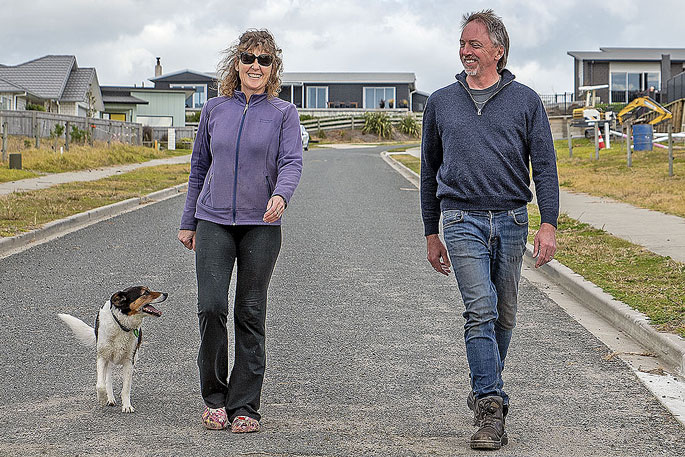The name Papakangahorohoro Road, suggested by Ngāti Awa for a new road at Piripai, a beachside neighbourhood just outside Whakatāne, has been unanimously rejected by developers and residents.
Whakatāne District Council’s living together committee heard developer Dianne Hawkes, speaking on behalf of her family and residents of the new road off 59 Bunyan Road.
She and her husband, Darrin, bought the property in 2006 and subdivided it shortly afterwards. Six homes have since been built and there are six further lots planned for housing, now being used as horse paddocks.
“We’ve put our hearts and our souls into this property,” Mrs Hawkes told council. We’ve created really nice sections that people want to live on.”
The Hawkes’ applied to name the road in 2019 in line with the council’s Road Naming and Property Addressing Policy, which states that it is the developer’s responsibility to propose appropriate names.
Their preferred name was Acacia Avenue. However, this was declined by the council of the time. The main point at issue was the use of the word “avenue” as the road did not fit the description of an avenue as set out in the policy.
Some councillors also considered the name did not properly reflect the area’s cultural significance for Ngāti Awa. The Hawkes were asked to propose alternative names and it was strongly recommended they consult with Te Rūnanga o Ngāti Awa on these.
"We tried to engage with Ngāti Awa to discuss other options, but they would not engage with us,” Mrs Hawkes told the councillors yesterday.
“We are not a faceless corporate, the name of our road is very important to us. All the residents have become our friends and they are wonderful members of our community and deserve recognition and consideration.”
The council recently engaged with Ngāti Awa through cultural adviser Pouroto Ngaropo who selected the name Papakangahorohoro Road, meaning “to move swiftly in battle formation like the crab”.
Mr Ngaropo said the area was where Ngāti Awa ancestor and chief Taiwhakaea trained his warriors in this battle formation.
However, this name also does not fit with council policy, which states road names must not exceed 15 characters as it could pose challenges in terms of adherence to addressing standards, road signage and ease of communication.
Papakangahorohoro has 17 characters.
Mrs Hawkes tabled a letter signed by every resident of the road, stating they did not agree with the name.
“It’s impractical, being too long and difficult to communicate both to emergency services and this will impact us every day. We appreciate the cultural significance of our area; however, we don’t want to live with the difficulties that this road name will bring.”
She said their preferred name remained Acacia Avenue, but they were willing to engage and consult with the council and local iwi around a mutually acceptable name.
“We don’t want an end result where not one of the owners is happy with a decision made against our wishes.”
A report by council staff points out the policy is due to be reviewed, “to provide more guidance on making sure the cultural, historical and geographic significance of the area” is prioritised.
Paul Warbrick, the council’s kaihautū for strategic Māori partnerships, said he would happily support an engagement process to try to find a pathway forward.
“It is a known fact that members of the Māori community at Piripai, Coastlands and the surrounding area and other residents haven’t always had the healthiest of relationships over a long time. However, there is an appetite amongst residents and the hapū to put that to the past,” Mr Warbrick said.
“Policies aren’t there for no reason,” Mayor Victor Luca said. “If we don’t abide by our own policies there are consequences,” He pointed out that the need to renew the policy came up in 2021, almost an identical situation.
“If the policy is not correct, we’ve had a year to fix it.”
Councillor Toni Boynton said she supported a collaborative approach, but the whole context when referring to a Māori name not meeting policy requirements due to the number of letters was “not good”.
“It’s just a continual sensitivity when you meet with these types of situations where your culture or heritage is questioned, or you have a policy that can override its legitimacy. It becomes quite tiring and quite emotionally reactive.”
After a lengthy discussion, committee asked staff to facilitate a collaborative approach with the Hawkes and local iwi and hapū, to agree on a road name.
Public Interest Journalism funded through NZ On Air.




2 comments
Oh, man!
Posted on 23-08-2023 15:14 | By Centurion
Whakatane District Council's 'living together committee'? What is that? Will it help me co-habit in a de facto relationship? Can I take a complaint against my teenagers' untidy living habits to them? The mind absolutely boggles at this preciousness.
Ridiculous
Posted on 23-08-2023 16:52 | By Let's get real
Why do we need street names that mean something...? If Acacia doesn't suit the woke council rules, what about Rimu, Totara or Kowhai. Some people need to take a step back and ask if there is really any need to push their own pointless agenda at every stage.
Leave a Comment
You must be logged in to make a comment.